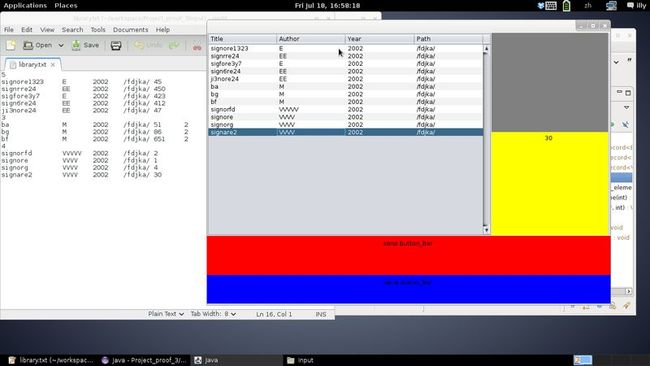《点击JTable的某一个行,在另一个JPanel显示其相对应内容的功能实现》
如下图,目标是,当我点击JTable的某一行(JTable的内容来自左边的文件),在GUI的黄色框,将要显示selected行的最后一个int数据。
简短提一下为什么写这篇东西:在功能实现过程中遇到了挺多的有意义的困难,是课上老师没有讲过的,接下来一个个列出。
问题一:第一个遇到的问题是不熟悉ListSelectionListener的用法,更不知道ListSelectionModel的用法,认为ListSelectionModel是个可有可无的选择(说出来还有点不好意思呢)。
这里就讲一下ListSelectionModel的设置方法,先从table里挖出selectionMode, 然后给selectionMode加上ListSelectionListener, 最后再给予设置(我自己的版本中只允许单选),所以就是:
selectionMode = table.getSelectionModel(); selectionMode.addListSelectionListener(this); selectionMode.setSelectionMode(ListSelectionModel.SINGLE_SELECTION);
问题二: 解决完第一个问题我的码看起来是这样的:
public class Main_panel extends JPanel{
private Research_and_InfoPanel research_and_infoPanel;
private JScrollPane scrollpane;
private ListSelectionModel listSelectionModel;
Main_panel(){
super();
BoxLayout main_layout = new BoxLayout(this, BoxLayout.X_AXIS);
setLayout(main_layout);
//creation panels
research_and_infoPanel = new Research_and_InfoPanel();
//database for TablePanel
Vector<String> column_names = new Vector<String>();
column_names.add("Title");
column_names.add("Author");
column_names.add("Year");
column_names.add("Path");
Vector<Object> data = new Vector<Object>();
data = proof_main.libreria.merge_table_elements();
//define JTable
JTable table = new JTable(data,column_names);
//define Jscrollpane that contain the table
scrollpane = new JScrollPane(table,ScrollPaneConstants.VERTICAL_SCROLLBAR_ALWAYS,ScrollPaneConstants.HORIZONTAL_SCROLLBAR_AS_NEEDED );
listSelectionModel = table.getSelectionModel();
listSelectionModel.addListSelectionListener(new SelectionListener());
scrollpane.setPreferredSize(new Dimension( 450, 550));
research_and_infoPanel.setPreferredSize(new Dimension( 250, 550));
add(scrollpane);
add(research_and_infoPanel);
}
class SelectionListener implements ListSelectionListener {
public void valueChanged(ListSelectionEvent e) {
// TODO Auto-generated method stub
int selectedRow = table.getSelectedRow();
String title = (String) table.getValueAt(selectedRow, 1);
//research_and_infoPanel.displayInfo(selectedRow, title); <--这是我将来想要调用的函数,属于research_and_infoPanel 也就是黄色方块
}
}
}
可以看到,我的JTable, JScrollPanel 和 ListSelectionListener 以及他的valueChanged函数都在 Main_Panel 当中,有点混乱,所以我就想要分开Main_Panel 和其他部分元素,建了一个新的JScrollPanel子类,另开一页。效果是这样的:
public class myScrollPane extends JScrollPane implements ListSelectionListener {
private JTable table;
private ListSelectionModel selectionMode;
myScrollPane(){
super();
//database for table
Vector<String> column_names = new Vector<String>();
column_names.add("Title");
column_names.add("Author");
column_names.add("Year");
column_names.add("Path");
Vector<Object> data = new Vector<Object>();
data = proof_main.libreria.merge_table_elements();
//define JTable and add it in scrollpane
table = new JTable(data,column_names);
setViewportView(table);
//set scrollpane
setVerticalScrollBarPolicy(VERTICAL_SCROLLBAR_ALWAYS);
setHorizontalScrollBarPolicy(HORIZONTAL_SCROLLBAR_AS_NEEDED);
//set selectionMode and add Listener
selectionMode = table.getSelectionModel();
selectionMode.addListSelectionListener(this);
selectionMode.setSelectionMode(ListSelectionModel.SINGLE_SELECTION);
}
public void valueChanged(ListSelectionEvent e) {
//rows count from zero
int selectedRow = table.getSelectedRow();
selectedRow++;
Main_panel.research_and_infoPanel.displayInfo(selectedRow);
}
}
又记起了一个因为无知而浪费了不少时间的问题,就是16行, 我天真地以为只要用 add(table) 就有效,结果Table显示不出来,仔细看了下手册发现需要用setViewportview(table).
OK, 这样总体上看起来清爽整齐多了,我也“解禁”了research_and_infoPanel.displayInfo(selectedRow)函数。接下来我们看看这个函数是怎样运作的。
public class Research_and_InfoPanel extends JPanel{
private JPanel research_panel, info_panel;
private JLabel label1;
Research_and_InfoPanel(){
research_panel = new JPanel();
info_panel = new JPanel();
research_panel.setMaximumSize( new Dimension( 250, 500) );
info_panel.setMaximumSize( new Dimension( 250, 500) );
research_panel.setBackground(Color.gray);
info_panel.setBackground(Color.yellow);
BoxLayout secondary_layout = new BoxLayout(this, BoxLayout.Y_AXIS);
setLayout(secondary_layout);
label1 = new JLabel();
info_panel.add(label1);
add(research_panel);
add(info_panel);
}
public void displayInfo(int numberRow){
char filetype = proof_main.libreria.check_filetype(numberRow);
Vector<Object> extra_info = proof_main.libreria.get_info(filetype,numberRow);
switch(filetype){
case 'E': {
label1.setText(extra_info.get(0).toString());
}
break;
case 'M': {
label1.setText(extra_info.get(0).toString());
}
break;
case 'V': {
label1.setText(extra_info.get(0).toString());
}
break;
}
}
}
//以下是libreria.get_info(filetype,numberRow)函数内容
public Vector<Object> get_info(char filetype, int number){
Vector<Object> extra_info = new Vector<Object>();
extra_info.clear();
int bound_E = record_E.media_files.size();
int bound_M = bound_E + record_M.media_files.size();
switch(filetype){
case 'E': {
extra_info.addElement(record_E.media_files.get(number-1).get_n_pages());
}
break;
case 'M': {
number = number-bound_E;
extra_info.addElement(record_M.media_files.get(number-1).get_duration());
extra_info.addElement(record_M.media_files.get(number-1).get_sample_rate());
}
break;
case 'V': {
number = number-bound_M;
extra_info.addElement(record_V.media_files.get(number-1).get_duration());
}
break;
}
return extra_info;
}
上面贴的码分两部分,第一部分是Research_and_InfoPanel类,里面有JLabel,故名有两个panel,但这不是我们的重点,重点在它在displayInfo中的码,因为这里面才是把数字挖出来的码。
可以看到,挖出的数据由proof_main.libreria.get_info(filetype,numberRow)提供,这里提一下我有三种不同类型的文件,是E,V和M,读者们可以当这事儿没有。而numberRow则是被鼠标或键盘选中的行,从上上个例子中用table.getSelectedRow挖出,被传啊传的直到传给libreria.get_info()。
在这篇里我就不提供别的没有重要联系的码,但是需要解释一下另有load()函数负责从文件中读取数字并装入record_E.media_files,record_M.media_files,record_V.media_files中的,大家可以想象以上第60,62,68行其实是对应的数字(在第一张图片中,相对应的数字是30)。
load()函数我以后会在未来的新文中献出。
